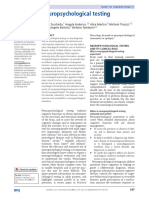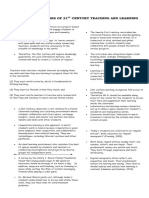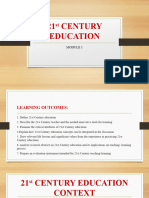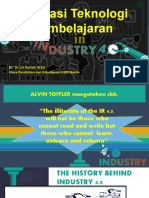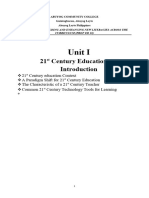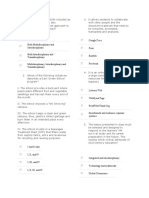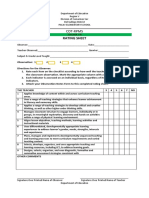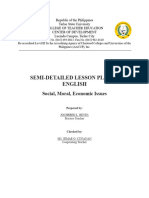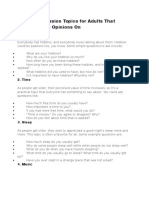Educ 10
Educ 10
Uploaded by
Molabola Eduardo, III C.Copyright:
Available Formats
Educ 10
Educ 10
Uploaded by
Molabola Eduardo, III C.Original Title
Copyright
Available Formats
Share this document
Did you find this document useful?
Is this content inappropriate?
Copyright:
Available Formats
Educ 10
Educ 10
Uploaded by
Molabola Eduardo, III C.Copyright:
Available Formats
Long Quiz Reviewer (Group 1-4) -Integrates HOTS,
multiple intelligence,
technology and
21st Century Education- multimedia, multiple
education that responds to the literacies, authentic
economical, technological, and assessments.
societal shifts that are happening
at an ever – increasing pace.
Learning Environment-
st
21 Century School focuses on students are encouraged to
Project- based curriculum. have collaborative and
Schools will go from building to cooperative learning w/ peers.
nerve centers.
-Should be
-Creates culture of inquiry environmental- friendly,
energy efficient, and
-Teachers are the facilitator of green school
knowledge rather than
dispenser -Ideal learning
environment have plenty
Implication for teachers wall space displaying
students work and
1. Teacher must discover performance.
student interest
Technology in the 21st
2. They must be still curious Century Pedagogy
3. They must be flexible in Technologies are tools
teaching students use to create
knowledge for personal
4. They must excite learners and social change.
to become more
resourceful Pros
- Access to
21st Century Curriculum- had Information
critical attributes that are - Enhanced
interdisciplinary, project- Collaboration
based, and research driven. - Individualized
Learning
-it is connected to local, - Preparation for
national and global Future Careers
communities. - Global Connectivity
• Initiative Leadership
• Social skills
Cons
• According to Partnership for
- Digital Distraction 21st Century Skills (p21),
- Inequality in Access various industries look for
- Privacy Concerns employees who can think
- Dependence on Screens critically, solve problems
- Technological Obsolescence creatively, innovate,
collaborate and communicate.
Understanding 21st Century Paradigm Shift for 21st Century
Learners Education
Digital Natives = Students Before- Time-based
Digital Immigrants = Educators Memorization of discrete facts,
LOT skills in Bloom’s Taxonomy,
Textbook-driven, Passive
Henry J. Kaiser Family Learning, Isolation and walled
Foundation- 8-18yrs old screen classroom, Teacher-centered,
time 6hrs a day. Little to no student freedom,
Discipline problems, Fragmented
Dr. Michael Wesch students curriculum, Formal assessment,
only utilize tech-tools for Assessment for marking
entertainment purposes. purposes, Low expectations,
Teacher is judge, Curriculum is
irrelevant and meaningless, print
21st Century Skills Outcome as primary vehicle of learning and
and the Demand in the Job assessment, Student diversity is
Market ignored, Students just follow
orders and instructions, Literacy
Learning Skills is the 3R’s (reading, writing, and
critical thinking ‘rithmetic, Factory model.
creative thinking
collaborating After Outcome-based What
communicating students Know, Can Do, and Are
Like after all the details are
Literacy Skills forgotten, Higher order thinking
Information literacy skills, Research-driven, Active
Media literacy Learning. Collaboration and
Technology literacy global classroom, Student-
centered, Great deal of student
Life Skills freedom, No “discipline
• Flexibility Productivity problems”, Integrated and
Interdisciplinary curriculum, Curriculum should adhere
Student’s performance to learning even outside
Assessment for instruction to premises.
gauge learning outcome, high Student- Centered
expectations, Self, peer and Differentiated instruction to
others serve as evaluator, address diversity, learning style,
Curriculum is connected to interests, needs and abilities of
student’s interest, experiences, students.
talents and the real world,
Performances, projects and 21st Century Skills
multiple forms of media, Address Develop life and work
student diversity, Students are skills, such as critical and
empowered to lead and initiate creative thinking, problem-
creating solutions, Multiple solving, and decision-making and
literacies of the 21st Century, ICT literacy and skills.
Global model
Project-Based and Research-
Critical Attributes of 21 st
Driven
Century Education Need for knowledge and
skills in research, such as self-
Integrated and Interdisciplinary directed activities, learning
Interfacing various projects, investigatory projects,
disciplines in an integrated capstones and other research-
manner. It needs curriculum to be based output.
reviewed to create strategies and
infuse different subjects. Relevant, Rigorous and Real
World
Technologies & Media The use of current and
Need to acquire and use relevant information linked to
computer and multimedia real-life situations and contexts.
equipment to enhance learning.
Learning and Innovation Skills
Global Classroom
Include current global issues/ Critical Thinking and Problem
concerns such as cultural Solving
diversity, climate change, global
warming 1. Work together effectively in
team
Creating/Adapting to Constant 2. Reason effectively
Personal and Social Change 3. Make judgement & Decisions
and Lifelong Learning 4. Solve Problems
Teacher must facilitate
even beyond academics. Communication
Non- Cognitive Skills-
1. Communicate clearly personality and attitude
Soft skills- communication,
Collaboration collaboration, empathy
1. Work together effectively in Seven Survival Skills by Tony
team Wagner (2010) book from “the
global achievement gap”
Creativity and Innovation
1. Critical thinking and
1. think creatively problem-solving
2.work creatively w/ others 2. Collaboration across
3. implement innovations networks and leading by
influence
21st Century Skills 3. Agility and adaptability
4. Initiative and
Broad set of knowledge, skills, entrepreneurialism
work habits, and character traits 5. Effective oral and written
communication
Can be applied generally across 6. Accessing and analyzing
discipline information
7. Curiosity and imagination
Abilities to survive information
age 21ST CENTURY SKILLS as
CORE COMPETENCIES
Knowledge and Skills
COLLABORATION
Applied Skills- put into real-life DIGITAL LITERACY
setting knowledge CRITICAL THINKING
Cross-Curricular Skill- essential PROBLEM SOLVING
abilities across different subject
and areas. Characteristics of a 21st
Cross-Disciplinary Skill- same Century Teacher
w/ CCS but in higher education
and professional context Multiliterate, Multi-specialist,
Interdisciplinary Skill- uses multi-skilled, self-directed, lifelong
knowledge & skills to solve learner, flexible and creative,
complex problems and gain new problem solver, Critical thinker,
insight. passion for excellent teaching,
Transferable skills/ Portable High Emotional Quotient
skills- abilities that developed
across disciplines Tools for Learning
1. Affinity Groups- unite 18. WebQuest Page- array of
individuals with common topics with a template for creating
interests. own.
2.Blogs- interactive websites 20. Literacy Web- online portal
3. E-Portfolio- documentation of for new literary sources.
outputs for reflective learning
4. Hypertext- electronic text that
has links embedded like
multimedia INFORMATION MEDIA AND
5. Podcasts- audio files on the TECHNOLOGY SKILLS
internet.
6. Web 2.0- 2nd Generation web- Media Literacy- underscores
based communities that understanding both how and why
demonstrate participatory media messages are
literacies constructed; creating media
7. Myspace- interactive products by understanding and
networking site for personal utilizing the most appropriate
profiles, blogs, and multimedia. media creation tools,
8. Second Life- 3d virtual word characteristics and conventions.
uses avatar to socialize.
9. Semantic Web- single Technology Literacy- It pertains
mechanism search engine to the use of technology as a tool
10. Webkinz- internet simulation to research, organize, evaluate
wherein children learn pet care and communicate information.
and other skills
11. Wiki- software for Information Literacy- It refers to
collaboration and communication. accessing and evaluating
12. Youtube- video streaming information critically and
platform. competently and managing the flow
13.Google docs- collaborative of information from a wide variety of
sources.
document
14. Prezi- pre-made, creative
D. Life and Career Skills-
presentation templates Cultivating the ability to navigate the
15. Easybib- citation generator in complex life requires students to
any format develop the following life and career
16. Smartboards and Audio skills:
response system- digital
chalkboard People in the 21st century live
17. Read Write Think.org.- in a technology and media-
teachers instructional ideas for saturated environment marked
internet integration. by the following:
(1) Access to an abundance of Computer
information Technology
(2) Rapid changes in technology Internet
tools Media
(3) (3) The ability to collaborate and
mark individual contribution on an Later on, (based on lifestyle of
unprecedented scale. the society)
Information, Culture, and
universal literacy
Coding System
Life and Career Skills Literacies= Letteracies
1. Flexibility and adaptability Exploring New Literacies
2. Initiative and self-direction
3. Social and cross-cultural skill Multicultural Literacy-
4. Productivity and accountability Understanding ethnic groups and
5. Leadership and Responsibility focuses on complex issue of
identity, diversity, and citizenship.
21st Century Support Systems
Social Literacy
st
• 21 Century Standards the development of social skills,
• 21st Century knowledge and values to act
Assessments accordingly.
• 21st Century Curriculum
and Instruction Media Literacy- is the ability to
• 21st Century Professional access, analyze, evaluate, and
Development create media.
• 21st Century Learning
Environments Financial Literacy- is the ability to
make judgements in the use and
• To be continued
management of money.
New Literacy Definitions Digital Literacy- the ability to
effectively use digital devices for
Old Definition- reading and communication, expression,
writing collaboration, and advocacy
Beyond 1990’s Tech. Ecological Literacy- understanding
Advancement, change of living the principle of ecosystem towards
patterns, and new necessities sustainability.
create a new definition of
Literacy. Creative Literacy- is the ability to
make ideas and solve problems by
imagining that has value and
1990’s set of New Literacy
creativity.
Functional Literacy Second Level of Functional
An adult training to meet Literacy
independently the reading and
writing demands placed on an The Second Level of
individual. It stresses Verbal, Functional Literacy is to apply
cognitive and Computation literacy, mathematical
skills. information, skills in one’s
personal, social, economic, and
It is dubbed as survival literacy, cultural endeavors.
or reductionist Literacy
UNESCO defines Functional
Literacy as the ability of an
individual to take part in the
significant activities in
professional, social, political, and
cultural aspects in the society
that uses his/her literacy skills.
Literary Materials
presents READING, WRITING,
and NUMERACY concepts
using words and ideas needed
for learners to enhance sufficient
literacy skills and continue
independent learning.
Functional literary programs in
the Philippines
Agriculture, Health, Industry,
Family Planning
Specific Literacy
The job of the student is to
analyze, and to see what is
exactly needed and those that
are only taught.
this is to prevent job-skill
mismatch.
You might also like
- Zucchella - 2018 - NeuropsychologicDocument11 pagesZucchella - 2018 - NeuropsychologicClaudia SainzNo ratings yet
- The Secret Language of Your Name - Ch. 1Document26 pagesThe Secret Language of Your Name - Ch. 1Beyond Words Publishing92% (36)
- The Efficiency of Police Community Relations in Crime Prevention: Chapter 1Document19 pagesThe Efficiency of Police Community Relations in Crime Prevention: Chapter 1Vince Niño M. TuldaNo ratings yet
- Academic Writing - 4 - Descriptive and Process ParagraphsDocument28 pagesAcademic Writing - 4 - Descriptive and Process ParagraphsVannakPhonNo ratings yet
- Pointers Lesson 1Document4 pagesPointers Lesson 1Sidang HaponNo ratings yet
- Educ 6 1Document6 pagesEduc 6 1Rica NarioNo ratings yet
- Midterms ReviewerDocument5 pagesMidterms ReviewerdenissemarizpNo ratings yet
- Building and Enhancing New Literacies Across The CurriculumDocument13 pagesBuilding and Enhancing New Literacies Across The Curriculumggorgeous6317No ratings yet
- Module 8 Week 13Document9 pagesModule 8 Week 13Dela Cruz, Mariel G.No ratings yet
- 21st Century Skills and Changing Trends of TeachingDocument39 pages21st Century Skills and Changing Trends of TeachingshamimNo ratings yet
- 21st Century Part2 EndDocument42 pages21st Century Part2 EndMarjorie Lopez TiuNo ratings yet
- Lesson 1 21st Century Education - PPTX FinalDocument20 pagesLesson 1 21st Century Education - PPTX FinalMary Angeline De LeonNo ratings yet
- Building and Enhancing New LiteraciesDocument4 pagesBuilding and Enhancing New Literaciesrosequartzserenity2002No ratings yet
- Learning 21st-Century 21st-Century: Skills Requires TeachingDocument6 pagesLearning 21st-Century 21st-Century: Skills Requires TeachingRafsan WakanoNo ratings yet
- 21st CENTURY EDUCATIONDocument24 pages21st CENTURY EDUCATIONKirsten Jesah BuenaNo ratings yet
- 21st CenturyDocument13 pages21st CenturyImelda TiongNo ratings yet
- Group 2 BenlacDocument41 pagesGroup 2 BenlacLoveniath MieerahNo ratings yet
- Teknologi Pembelajaran-Tikomdik Seminar 2019Document20 pagesTeknologi Pembelajaran-Tikomdik Seminar 2019Heni FatmawatiNo ratings yet
- Task 1Document6 pagesTask 1maria gorobaoNo ratings yet
- 21st CEd-Km1.1Document65 pages21st CEd-Km1.1Rachel BangyodNo ratings yet
- 21st Century EducationDocument24 pages21st Century EducationpaulmichaelcagandeNo ratings yet
- 21ST Century TeacherDocument4 pages21ST Century TeacherhannahezekiahlegaspiNo ratings yet
- 21st Century TeacherDocument9 pages21st Century TeacherJade España De JesusNo ratings yet
- Benlac 1 6 - CompressDocument40 pagesBenlac 1 6 - Compressmaylsuuu3No ratings yet
- Module 1 Notes BenlacDocument6 pagesModule 1 Notes BenlacBSED ENGLISH 1DNo ratings yet
- Projections of 21 Century and Current Phenomena of EducationDocument15 pagesProjections of 21 Century and Current Phenomena of Educationmuna zihahNo ratings yet
- EDU 109 Module-1-Building-and-EnhancingDocument4 pagesEDU 109 Module-1-Building-and-EnhancingLie Raki-in100% (1)
- Curricular Landscape For The 21ST CenturyDocument9 pagesCurricular Landscape For The 21ST CenturyPatricia83% (6)
- WHAT SKILLS DO YOU NEEDS FOR THE 21st CENTURYDocument7 pagesWHAT SKILLS DO YOU NEEDS FOR THE 21st CENTURYMaribeth Marcial100% (1)
- 21ST Century EducationDocument7 pages21ST Century EducationmalayrolamesheijoyNo ratings yet
- 21st CENTURY SKILLS OF TEACHERS MFALDocument5 pages21st CENTURY SKILLS OF TEACHERS MFALJordz TV100% (1)
- ED 3 Material 2Document13 pagesED 3 Material 2Ajeia IsmaelNo ratings yet
- Module-1Document51 pagesModule-1Francelle MercadoNo ratings yet
- MODULE 2: Understanding The 21st Century Learners: Topic FrameworkDocument9 pagesMODULE 2: Understanding The 21st Century Learners: Topic FrameworkXeline Mae IdealNo ratings yet
- 1prelim Profed10Document15 pages1prelim Profed10JUNALYN MANATADNo ratings yet
- 1prelim Profed10Document11 pages1prelim Profed10JUNALYN MANATADNo ratings yet
- Educ 9 ReviewerDocument9 pagesEduc 9 Reviewerjemimahjoy.tabayayNo ratings yet
- 21st CENTURY EDUCATIONDocument15 pages21st CENTURY EDUCATIONARLENE PILAR AVECILLA100% (1)
- Educ221a - M8 Lesson 1 2Document6 pagesEduc221a - M8 Lesson 1 2FUENTES ANDREANo ratings yet
- Weekly Test in Introduction To Philosophy of The Human Person Prepared By: Fobe Mechael A. Nudalo MST-Araling PanlipunanDocument51 pagesWeekly Test in Introduction To Philosophy of The Human Person Prepared By: Fobe Mechael A. Nudalo MST-Araling PanlipunanFobe NudaloNo ratings yet
- Benlac ReviewerDocument16 pagesBenlac Reviewerdiaz.jaqNo ratings yet
- Edpck6 Prelim ReviewerDocument6 pagesEdpck6 Prelim ReviewerAira CorpuzNo ratings yet
- Building New CurriculumDocument33 pagesBuilding New CurriculumRalph John SabangNo ratings yet
- Azizi - Pembelajaran Abad Ke-21Document128 pagesAzizi - Pembelajaran Abad Ke-21Sevalingam Devarajan100% (3)
- EDUC 10 ReviewerDocument35 pagesEDUC 10 Revieweryuri lloydNo ratings yet
- Prof Ed 10 (Reviewer) Module 1-4Document21 pagesProf Ed 10 (Reviewer) Module 1-4dorensabanal03No ratings yet
- Prof Ed 2 Module 1Document9 pagesProf Ed 2 Module 1John Paul Guim GalillagaNo ratings yet
- Module 1Document33 pagesModule 1jennifferpabuayaNo ratings yet
- AaaaaaaaDocument3 pagesAaaaaaaaJuan PatricayoNo ratings yet
- Learning 21st-Century Skills Requires 21st-Century TeachingDocument7 pagesLearning 21st-Century Skills Requires 21st-Century TeachingMayrose Kamille LeomoNo ratings yet
- Educ95 Week2Document38 pagesEduc95 Week2Rose Marie BaylonNo ratings yet
- EDUC 302: The Teacher and The Community, School, Culture, and Organizational LeadershipDocument44 pagesEDUC 302: The Teacher and The Community, School, Culture, and Organizational LeadershipMarie ShaneNo ratings yet
- Benlac Prelim ReviewerDocument10 pagesBenlac Prelim ReviewerJames AcostaNo ratings yet
- Curriculum Week 18Document4 pagesCurriculum Week 18KylaMayAndrade100% (1)
- Building and Enhancing New Literacies Across The Curriculum 1 For MergeDocument134 pagesBuilding and Enhancing New Literacies Across The Curriculum 1 For Mergenicacadavero06No ratings yet
- CPE101 Module 5 Lesson 3 HandoutsDocument8 pagesCPE101 Module 5 Lesson 3 HandoutsAnne Mari Page PasenciaNo ratings yet
- Technology For Teaching and Learning: Elementary GradesDocument13 pagesTechnology For Teaching and Learning: Elementary GradesJessie CusiNo ratings yet
- Group 1-21st Century Teaching and Learning (Handouts)Document3 pagesGroup 1-21st Century Teaching and Learning (Handouts)Mayen DriveNo ratings yet
- P21 Framework 0515 PDFDocument2 pagesP21 Framework 0515 PDFLinda Xin YeeNo ratings yet
- Belsac Long QuizDocument7 pagesBelsac Long QuizPearly Ann R. EgeNo ratings yet
- ProfEd 110 - MODULE 1Document9 pagesProfEd 110 - MODULE 1kahel.1301No ratings yet
- ED 3 Material 1Document8 pagesED 3 Material 1Ajeia IsmaelNo ratings yet
- 21ST Century LearningDocument5 pages21ST Century LearningEunice Holgado100% (1)
- Movement Lesson Plan Click Clack MooDocument2 pagesMovement Lesson Plan Click Clack Mooapi-597638322No ratings yet
- Most Essential Learning Competencies (MELCS) Sir JoseDocument7 pagesMost Essential Learning Competencies (MELCS) Sir Josejose arendainNo ratings yet
- Day1 Sheet Avi3mDocument2 pagesDay1 Sheet Avi3mapi-277910705No ratings yet
- 1 Management Theories and PracticesDocument96 pages1 Management Theories and PracticesAsegid H/meskelNo ratings yet
- Idioms Phrasal VerbsDocument4 pagesIdioms Phrasal VerbsJosé Manuel da SilvaNo ratings yet
- Emotional Cues That Work Magic On CustomersDocument8 pagesEmotional Cues That Work Magic On CustomersVishesh DwivediNo ratings yet
- Cognitive Development and Language: Cluster 2Document34 pagesCognitive Development and Language: Cluster 2Che Soh bin Said SaidNo ratings yet
- IGCSE English LanguageDocument5 pagesIGCSE English LanguageAnonymous JM62lPsJYpNo ratings yet
- Group 3 Engl Ed 107 HandoutDocument7 pagesGroup 3 Engl Ed 107 Handoutlunaskye000No ratings yet
- Role of The InstructorDocument20 pagesRole of The InstructorrmaffireschoolNo ratings yet
- ANN ArchitecturesDocument26 pagesANN ArchitecturesKhushi GargNo ratings yet
- Blissvana Self-Love Quotient Quiz PDFDocument5 pagesBlissvana Self-Love Quotient Quiz PDFSunshineNo ratings yet
- Government New Law College Indore (M.P.) 2019-20: English Project "Tense and Voice"Document19 pagesGovernment New Law College Indore (M.P.) 2019-20: English Project "Tense and Voice"Shivam TiwariNo ratings yet
- Managing Difficult PatientDocument20 pagesManaging Difficult PatientsahirbuleNo ratings yet
- Info Sheet 3.1-1 (TLED 113)Document15 pagesInfo Sheet 3.1-1 (TLED 113)Lawson SohNo ratings yet
- Eidam and Partner Cross-Cultural Values of GermanyDocument6 pagesEidam and Partner Cross-Cultural Values of GermanyNezel Anne DoromalNo ratings yet
- Observation Rating SheetDocument3 pagesObservation Rating SheetRodrigo CollantesNo ratings yet
- Part A Math Context For Learning InformationDocument3 pagesPart A Math Context For Learning Informationapi-256550524No ratings yet
- The Future of Architectural Design Studio Is A SimulacrumDocument12 pagesThe Future of Architectural Design Studio Is A SimulacrumDragan MarkovicNo ratings yet
- Lesson Plan Social Moral Economic IssuesDocument4 pagesLesson Plan Social Moral Economic IssuesJochebed ReyesNo ratings yet
- 28 ESL Discussion Topics For Adults That Everyone Has Opinions OnDocument9 pages28 ESL Discussion Topics For Adults That Everyone Has Opinions OnIvana Kandić100% (1)
- Elect. Circ.: Recent Topics For ELEN E608Document2 pagesElect. Circ.: Recent Topics For ELEN E608Mangaka DomingosNo ratings yet
- Exceed Curric Structure PDFDocument2 pagesExceed Curric Structure PDFalaaqabiNo ratings yet
- Research TopicDocument27 pagesResearch TopicAhsanNo ratings yet
- Ban Biblio NumberedDocument23 pagesBan Biblio NumberedYayangAsanggaNo ratings yet
- Virtual Learning GuideDocument24 pagesVirtual Learning GuideCynier EroyNo ratings yet
